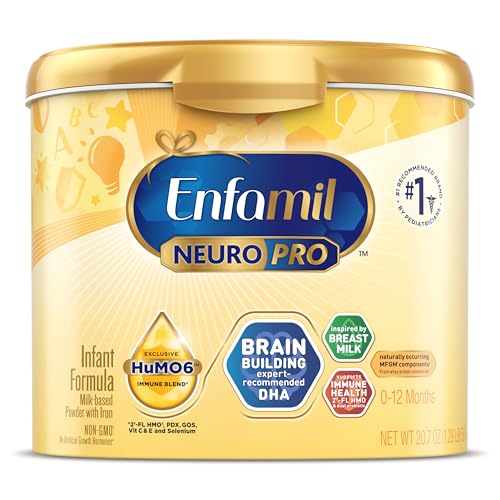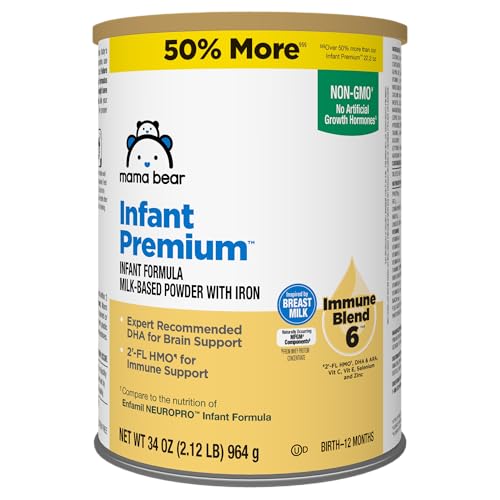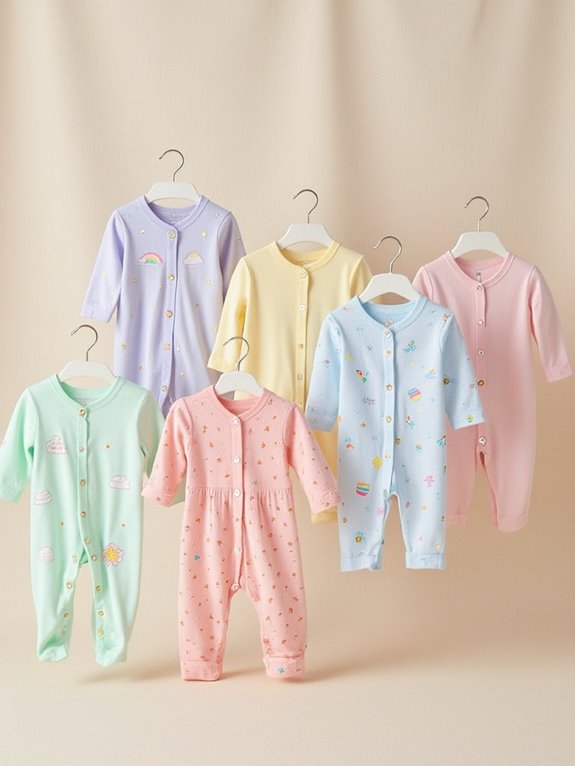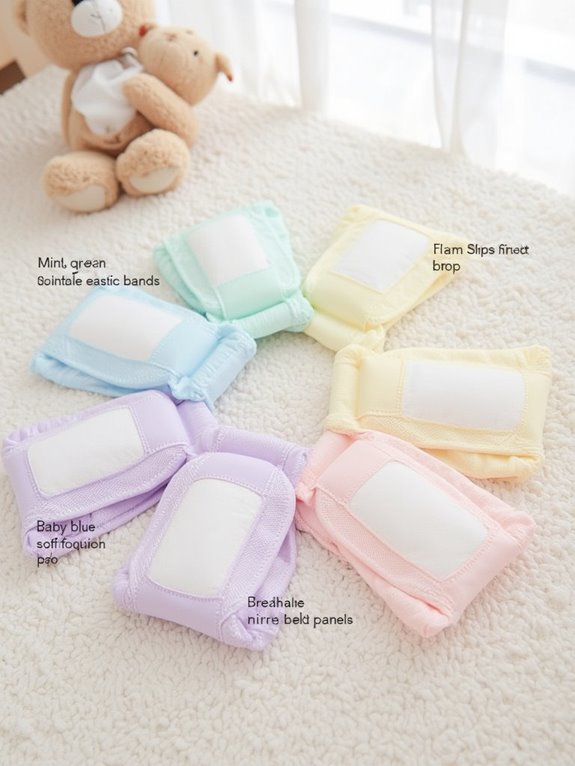As an Amazon Associate, we earn from qualifying purchases. Some links may be affiliate links at no extra cost to you. Although our opinions are based on curated research, we haven't used these products. Articles generated with AI.
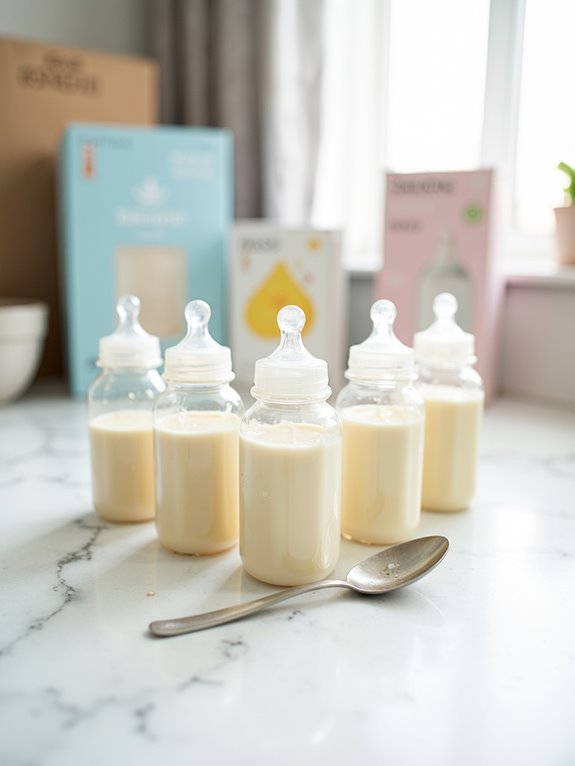
The 5 Best Baby Formulas of 2025, According to Pediatricians
According to pediatricians, the top baby formulas for 2025 include Similac 360 Total Care Ready-to-Feed, Enfamil NeuroPro Powder, Bubs 365 Day Grass Fed, Mama Bear Premium, and Similac 360 Total Care 24-Pack. These formulas deliver essential nutrients like DHA, ARA, and HMOs for brain development and immune support, while meeting strict safety standards. You’ll find options for sensitive stomachs, different age ranges, and various formats – from convenient ready-to-feed bottles to cost-effective powders. Let’s explore what makes each formula stand out.
Key Takeaways
- Similac 360 Total Care leads pediatrician recommendations with complete nutrition, HMOs, and MFGM for brain development and immune support.
- Enfamil NeuroPro features specialized ingredients and dual prebiotics for digestive health, closely matching breast milk composition.
- Bubs 365 Day offers organic, non-GMO ingredients with easy mixability and comprehensive nutrition for babies throughout their first year.
- Mama Bear combines affordability with quality nutrition, featuring built-in scoop storage and essential nutrients for healthy development.
- Earth’s Best Organic provides natural ingredients, iron-fortified nutrition, and no artificial hormones, meeting strict organic certification standards.
Similac 360 Total Care Infant Formula, Ready to Feed (12 Pack)
Sale
Similac 360 Total Care Ready-to-Feed Formula stands out as the #1 choice for parents seeking hospital-grade nutrition that closely mirrors breast milk. This formula contains 5 HMO prebiotics that are structurally identical to those found in breast milk, supporting your baby’s immune health and brain development.
Key benefits:
- Non-GMO ingredients
- No artificial growth hormones
- Contains DHA, Lutein, and Vitamin E
- Reduces fussiness and gas
- Ready-to-feed convenience
Each 2 fl-oz bottle requires no mixing but must be used within 48 hours after opening. While pricier than powder options, you’ll find cost savings through MySimilac Rewards (up to $400) and Subscribe & Save programs.
Best For: Parents seeking a premium, hospital-grade infant formula that closely mimics breast milk’s benefits, especially those prioritizing convenience and babies with sensitive digestive systems.
Pros:
- Contains 5 HMO prebiotics identical to breast milk components, supporting immune health and brain development
- Ready-to-feed format requires no mixing, making it perfect for night feedings and travel
- Clinically proven to reduce fussiness and gas, with high tolerance among infants
Cons:
- More expensive than powdered formula options
- Short 48-hour shelf life after opening, which may lead to waste
- Bulky packaging makes it less convenient for travel and storage
Enfamil NeuroPro Baby Formula Powder (20.7 Oz)
Sale
Enfamil NeuroPro Baby Formula, Triple Prebiotic Immune Blend with 2'FL HMO & Expert Recommended...
- EXPERT RECOMMENDED DHA: Enfamil NeuroPro has expert recommended DHA which provides brain-building nutrition
- BRAIN-BUILDING NUTRITION: Get brain building nutrition inspired by breast milk from Enfamil
- SUPPORT FOR YOUR INFANT: Complete nutrition for babies through 12 months, easy-to-digest proteins and dual prebiotics for immune health
Parents seeking ideal brain development and immune support for their infants will find Enfamil NeuroPro Baby Formula Powder (20.7 oz) particularly valuable. You’ll get a complete formula with expert-recommended DHA and MFGM components that support cognitive development through age 5 when fed in the first year.
The formula’s exclusive HuMO6 immune blend strengthens your baby’s immune system, while easy-to-digest proteins provide essential nutrition. It’s non-GMO and trusted by pediatricians as the #1 infant formula brand. You can conveniently purchase with SNAP benefits or opt for a subscription to save money.
For babies up to 12 months, this formula delivers all-encompassing nourishment with proven brain-building ingredients and immune support.
Best For: Parents seeking a premium infant formula with proven cognitive development benefits and immune support for babies up to 12 months old.
Pros:
- Contains brain-building DHA and MFGM components with benefits extending to age 5
- Features exclusive HuMO6 immune blend for enhanced immune system support
- Made with non-GMO ingredients and easy-to-digest proteins
Cons:
- Higher price point compared to basic formula options
- Large container size may be too much for occasional users
- Powder form requires proper mixing and preparation
Bubs 365 Day Grass Fed Infant Formula (0-12 Months)
Sale
Bubs 365 Day Grass Fed Infant Formula with Iron, Cow Milk-Based Powder for Infants 0-12 Months, Made...
- COMPLETE INFANT NUTRITION: Made in Australia, Bubs 365 Day Grass Fed Infant Formula has been carefully developed for bubs ages 0 to 12 months. Enriched with omega-3 DHA...
- IMMUNE SUPPORT: Prebiotics & probiotics provides extra tummy support with 16 essential vitamins & minerals. Our milk, produced from 365-day grass fed, free to roam cows,...
- GOODNESS FROM THE FARM: Bubs 365 Day Grass Fed Infant Formula is securely blended and made with whole milk. No GMOs, corn syrup, artificial colors, flavors or...
Backed by Australia’s strict quality standards, Bubs 365 Day Grass Fed Infant Formula stands out as an ideal choice for babies aged 0-12 months who need a nutritionally complete, easily digestible formula.
The formula’s key features include:
- Non-GMO whole milk from grass-fed cows
- Essential omega-3 DHA and omega-6 ARA
- 16 vitamins and minerals
- Prebiotics and probiotics for immune support
You’ll find it mixes easily with minimal foaming and dissolves completely. Store unopened cans at room temperature, and use opened cans within one month. For preparation, mix one level scoop per 2 fl oz of water. Use prepared formula within 24 hours if refrigerated or 1 hour at room temperature.
Best For: Parents seeking a high-quality, nutritionally complete infant formula made with grass-fed cow’s milk that’s easy to digest and prepare.
Pros:
- Made with non-GMO whole milk from 365-day grass-fed cows, enriched with essential nutrients and probiotics
- Excellent mixability with minimal foaming, making preparation easy and convenient
- Strong safety and quality standards backed by Australian manufacturing regulations
Cons:
- Some issues reported with packaging damage during shipping
- Smaller can sizes compared to some competitors
- Availability can be limited, with occasional stock shortages
Mama Bear Premium Milk-Based Baby Formula Powder with Iron
Amazon Brand - Mama Bear Infant Premium Milk-Based Baby Formula Powder with Iron, 2'FL HMO, Omega-3...
- COMPLETE NUTRITION: This infant formula provides complete nutrition for baby's first year
- Expert recommended DHA for brain support and immune supporting HMOs commonly found in breast milk
- Compare to the nutrition of Enfamil NeuroPro
While searching for a cost-effective alternative to premium brands, budget-conscious families will find Amazon’s Mama Bear Premium Milk-Based Baby Formula Powder with Iron to be a compelling choice. This formula offers similar nutritional benefits to Enfamil NeuroPro at a lower price point.
Key features include:
- 2FL HMO for immune support
- Omega-3 DHA and choline for brain development
- Non-GMO ingredients
- Built-in scoop holder
- 2.12-pound container size
Parents report successful changes from name brands, though gradual mixing is recommended. Subscribe-and-save options provide additional cost savings, making it considerably cheaper than store brands. However, consider stock availability when planning purchases, as temporary shortages can occur.
Best For: Budget-conscious parents seeking a high-quality formula with similar nutritional benefits to premium brands like Enfamil NeuroPro, who want to save money without compromising on essential nutrients for their baby’s development.
Pros:
- Significantly lower price point compared to name brands, with additional savings through subscribe-and-save options
- Contains key nutrients like 2FL HMO, DHA, and choline for brain development and immunity, matching premium formula compositions
- Convenient packaging with built-in scoop holder and generally positive reports of digestibility
Cons:
- Occasional stock availability issues can make it unreliable for urgent needs
- Initial transition period may cause temporary digestive adjustments
- Limited retail availability (Amazon-exclusive) means no immediate local purchase options
Similac 360 Total Care Infant Formula (24 Pack, Ready to Feed)
Sale
Similac 360 Total Care Infant Formula, Has 5 HMO Prebiotics, Our Closest Prebiotic Blend to Breast...
- HAS OUR CLOSEST PREBIOTIC BLEND TO THAT IN BREAST MILK: Similac 360 Total Care, our biggest formula breakthrough, has an exclusive blend of 5 HMO prebiotics structurally...
- 360 WHOLE-BABY SUPPORT: Nutrition designed to help support the immune system, brain development, and digestive health
- DESIGNED TO HELP STRENGTHEN THE IMMUNE SYSTEM: Similac 360 Total Care is designed to help strengthen baby’s immune system
Looking for a hospital-trusted formula that matches breast milk’s key components? Similac 360 Total Care offers a unique blend of 5 HMO prebiotics identical to those found in breast milk. You’ll find this ready-to-feed formula in convenient 8-fl oz bottles, packaged in sets of 24.
Key features:
- Non-GMO ingredients
- No artificial growth hormones
- Milk from non-rbST-treated cows
- Supports immune system and brain development
- Safe for infants with galactosemia
Parents report strong acceptance, with babies readily consuming the formula. While it’s priced at a premium, the ready-to-feed format proves invaluable for travel and daily use. Many families opt for subscription services to maintain a consistent supply.
Best For: Parents seeking a premium, hospital-trusted formula that closely mimics breast milk, especially those who value convenience and are willing to pay more for ready-to-feed bottles.
Pros:
- Contains 5 HMO prebiotics structurally identical to those in breast milk
- Ready-to-feed format is convenient for travel and eliminates preparation time
- High acceptance rate among infants with positive feedback on digestion
Cons:
- Premium pricing makes it more expensive than powder alternatives
- 8 oz bottles may be too large for newborns, potentially leading to waste
- Requires more storage space compared to concentrated or powder formula
Factors to Consider When Choosing Baby Formula
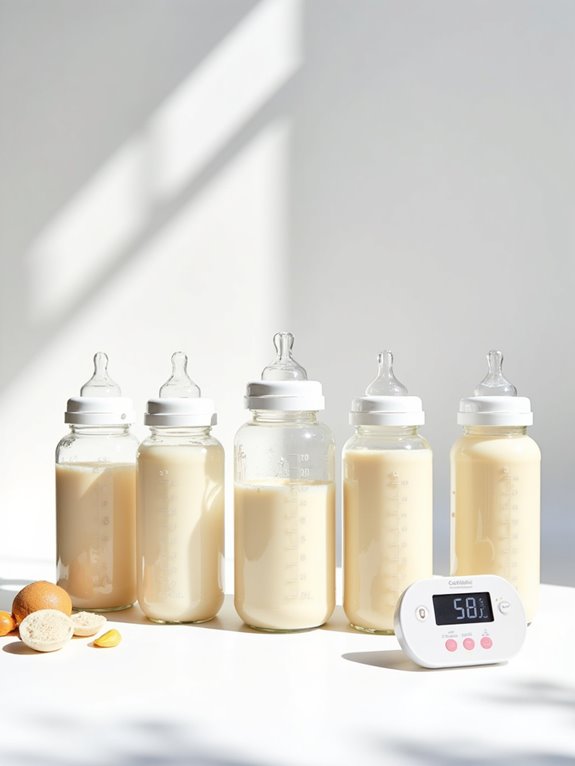
When you’re selecting a baby formula in 2025, you’ll need to carefully evaluate several key factors to guarantee your baby receives ideal nutrition. You should check that the formula matches your baby’s age requirements, contains essential nutrients like DHA and iron, and comes in a form (powder, liquid concentrate, or ready-to-feed) that fits your lifestyle and preparation preferences. Your choice will also depend on your baby’s digestive sensitivities, such as lactose intolerance or protein allergies, along with your household budget since formula types can vary greatly in cost.
Nutritional Value and Ingredients
Understanding the nutritional value and ingredients in baby formula represents a critical first step in making an informed choice for your infant’s health. You’ll want to look for formulas that closely match breast milk’s composition with essential nutrients like DHA and ARA for brain development.
Key ingredients to seek:
- HMOs (Human Milk Oligosaccharides) for immune support
- MFGM for cognitive development
- Prebiotics and probiotics for digestive health
- Complete vitamin and mineral profile
- Non-GMO ingredients
Check that the formula contains appropriate ratios of:
- Proteins that are easily digestible
- Healthy fats for growth
- Carbohydrates for energy
Avoid formulas with:
- Artificial growth hormones
- Unnecessary artificial additives
- Excessive sugar content
These nutritional components work together to support your baby’s overall development and well-being.
Baby’s Age Requirements
After considering the nutritional components of baby formula, selecting the right age-specific product becomes the next important decision. You’ll need to match your baby’s age precisely with the formula’s intended age range to ensure proper nutrition and development.
Age-Specific Guidelines:
- 0-6 months: Choose formulas with higher fat content and specialized early-growth nutrients
- 6-12 months: Select formulas specifically labeled for this age group
- 12+ months: Consider toddler formulas with adjusted nutrient levels
When shifting between age groups, you’ll want to make gradual changes to prevent digestive issues. Always check the label’s age recommendation before purchase, as using the wrong formula could lead to nutritional gaps. Remember that each age range requires different nutrient concentrations to support your baby’s changing developmental needs.
Form and Preparation
Parents face a crucial choice between three main formula forms, each offering distinct advantages for infant feeding.
Ready-to-feed formulas provide maximum convenience – you’ll find them perfect for travel and nighttime feedings since they require no preparation. However, they’re typically more expensive.
Powder formulas need careful measuring and mixing with water. You’ll need to:
- Clean all preparation surfaces and utensils
- Wash your hands thoroughly
- Follow exact measurement ratios
- Mix until completely dissolved
Liquid concentrate formulas fall between the other two options. You’ll need to dilute them with water according to the manufacturer’s specific instructions.
Remember: Once you’ve prepared any formula, use it immediately or store it in the refrigerator. Don’t keep mixed formula longer than the recommended timeframe on the package to safeguard your baby’s safety.
Digestive Sensitivity Concerns
When your baby shows signs of digestive sensitivity, selecting the right formula becomes especially crucial for their comfort and development. You’ll want to look for formulas with partially hydrolyzed proteins, which are easier for sensitive tummies to process.
Key features to consider:
- Prebiotics and probiotics that support healthy gut bacteria
- HMOs (human milk oligosaccharides) for improved digestion
- No artificial additives or preservatives
- Limited sugar content to prevent irritation
Watch your baby’s response to different formulas carefully, and don’t hesitate to consult your pediatrician if you notice ongoing digestive issues. Specialized sensitive-stomach formulas are specifically engineered to reduce common problems like:
- Excessive gas
- Fussiness
- Spit-up
- Colic symptoms
These formulas can make a significant difference in your baby’s feeding experience and overall comfort.
Cost and Budget
The true cost of baby formula extends far beyond the initial price tag, encompassing both short-term expenses and long-term financial planning. When calculating your formula budget, you’ll need to take into account several key factors:
Cost-Saving Strategies:
- Choose powdered formula over ready-to-feed options for better value
- Buy in bulk when possible to reduce per-ounce costs
- Sign up for manufacturer rewards programs and rebates
- Compare prices across retailers and online platforms
- Look for subscription services that offer regular discounts
Price Comparison Tips:
- Calculate the cost per ounce rather than package price
- Factor in preparation time and convenience needs
- Consider storage requirements and shelf life
- Balance cost with nutritional quality
- Account for your baby’s feeding schedule and quantity needs
Remember to maintain your chosen formula brand once you find one that works, as switching solely for cost savings isn’t recommended.
Storage and Shelf Life
Proper storage of baby formula plays a crucial role in maintaining its safety and nutritional value. You’ll need to follow specific guidelines to guarantee your baby’s formula stays fresh and safe to consume.
Key Storage Guidelines:
- Keep unopened formula in a cool, dry place for up to 24 months
- Use opened ready-to-feed formula within 48 hours
- Store opened powder formula for no longer than one month
- Consume prepared bottles within 24 hours when refrigerated
For maximum safety and quality:
- Check expiration dates before purchase and use
- Store formula in airtight containers
- Keep powder formula away from moisture
- Monitor storage temperatures
- Discard any formula showing signs of spoilage
Following these storage requirements helps maintain nutritional integrity and protects your baby’s health while preventing unnecessary waste.
Brand Quality Standards
Beyond proper storage practices, selecting a formula brand with rigorous quality standards will impact your baby’s health and development. You’ll want to look for brands that meet FDA regulations and international safety standards for infant nutrition.
Key Quality Indicators to Check:
- Non-GMO ingredient sourcing from ethical suppliers
- Good Manufacturing Practices (GMP) certification
- Clear, transparent labeling of all ingredients
- Regular third-party testing documentation
- Compliance with nutritional requirements
These standards help protect your baby from potential contaminants and ensure proper nutritional content. When evaluating brands, you’ll find that reputable manufacturers maintain strict oversight of their supply chains and manufacturing processes. They’ll also provide detailed information about their quality control measures and testing protocols. This transparency gives you confidence in the formula’s safety and nutritional integrity.
Special Dietary Needs
When selecting formula for infants with special dietary needs, you’ll need to carefully evaluate specific ingredients and nutritional compositions that align with your baby’s health requirements.
Key considerations for special dietary needs include:
- Hypoallergenic or lactose-free options for babies with allergies or sensitivities
- Iron-fortified formulas for enhanced nutritional support
- Plant-based alternatives for vegetarian or vegan infants
- Specialized formulas for metabolic conditions like galactosemia
Before choosing any specialized formula, it’s crucial to consult your pediatrician. They’ll help determine which formula type best addresses your baby’s unique dietary requirements and medical conditions. Some infants may need formulas enriched with specific nutrients or prebiotics, while others require formulas that exclude certain proteins or sugars. Your healthcare provider will guide you through the selection process based on your baby’s individual needs.
Frequently Asked Questions
Can I Mix Different Brands of Formula Throughout the Day?
While it’s technically possible to mix different formula brands, pediatricians don’t recommend it. You should stick to one brand to avoid:
- Digestive issues from varying ingredients
- Difficulty identifying allergens if reactions occur
- Inconsistent nutrient levels
If you need to switch brands, do it gradually over 5-7 days by mixing increasing amounts of the new formula with decreasing amounts of the old one. Always consult your pediatrician before making formula changes.
What Are the Signs My Baby Isn’t Tolerating Their Formula Well?
Watch for these key signs that your baby isn’t tolerating their formula well:
- Excessive spitting up or vomiting after feeds
- Significant fussiness or crying during/after eating
- Blood or mucus in their stool
- Extreme gas or bloating
- Hard, dry stools or diarrhea
- Poor weight gain
- Rash or hives
If you notice any of these symptoms, contact your pediatrician. They can help determine if your baby needs a different formula type or if there’s another underlying issue.
How Long Can Prepared Formula Sit at Room Temperature?
Prompt, proper preparation prevents problems! Here’s what you need to know about prepared formula safety:
Don’t let prepared formula sit at room temperature for more than 2 hours. If your baby doesn’t finish their bottle, you’ll need to discard the remainder. Once you’ve warmed a bottle, use it within 1 hour. For extra safety, you can store prepared formula in the refrigerator for up to 24 hours at 40°F (4°C) or below.
When Should I Switch From Infant Formula to Toddler Formula?
You’ll typically shift from infant formula to toddler formula when your baby turns 12 months old. However, many pediatricians say it’s not necessary to use toddler formula at all. Instead, you can move your 1-year-old directly to whole milk, along with a balanced diet of solid foods. If you’re unsure about the right choice for your child, consult your pediatrician for personalized guidance based on your baby’s growth and nutritional needs.
Can I Warm Formula in the Microwave?
Don’t play with fire – never warm baby formula in the microwave. Here’s why:
- Microwaves heat unevenly, creating dangerous “hot spots” that can burn your baby’s mouth
- The uneven heating can destroy important nutrients
- It’s harder to control the temperature
Instead, you should:
- Use a bottle warmer
- Place the bottle in warm water
- Run it under warm tap water
- Serve at room temperature (it’s perfectly safe)
Always test the temperature on your wrist before feeding.


